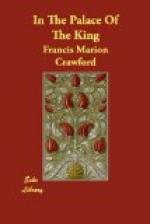He knew her secret, too, as he had formerly known how she had forged the letters that brought about the deaths of Don Carlos and of Queen Isabel; for the Princess ruled him by fear, and knew that she could trust him as long as he stood in terror of her. He knew, therefore, that she had not only forgiven Don John for not yielding to her charm in former days, but that she now hoped that he might ascend the throne in Philip’s stead, by fair means or foul, and that the news of his death must have been a destructive blow to her hopes. He made up his mind to tell her first that he was alive, unless he could get speech with Dolores alone, which seemed improbable. Having decided this, he hastened his walk again.
Before he reached the lower story of the palace he composed his face to an expression of solemnity, not to say mourning, for he remembered that as no one knew the truth but himself, he must not go about with too gay a look. In the great vestibule of the hall he found a throng of courtiers, talking excitedly in low tones, but neither Dolores nor Ruy Gomez was there. He sidled up to a tall officer of the guards who was standing alone, looking on.
“Could you inform me, sir,” he asked, “what became of Dona Dolores de Mendoza when she left the hall with the Prince of Eboli?”
The officer looked down at the dwarf, with whom he had never spoken before, but who, in his way, was considered to be a personage of importance by the less exalted members of the royal household. Indeed, Adonis was by no means given to making acquaintance at haphazard with all those who wished to know him in the hope that he might say a good word for them when the King was in a pleasant humour.




